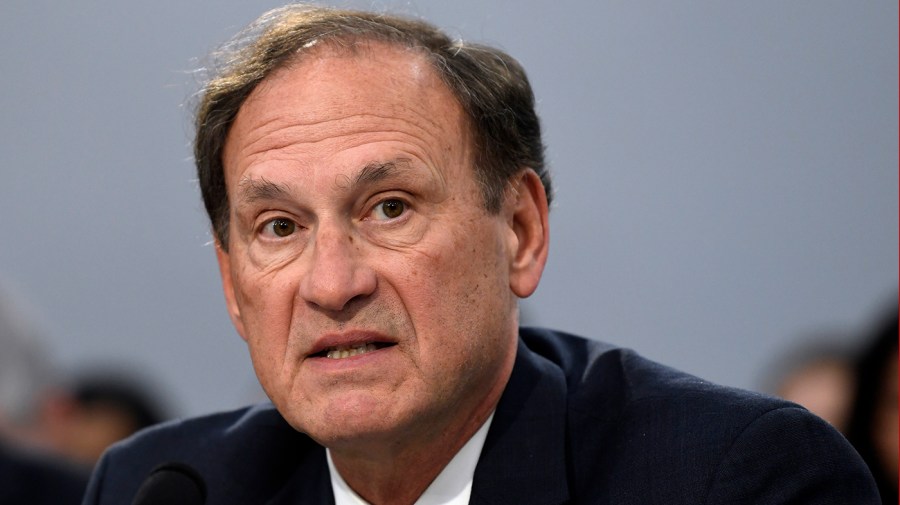Business
Supreme Court to consider ‘quadrillion-dollar question’ in major tax case on November 28, 2023 at 11:00 am Business News | The Hill

The Supreme Court will hear oral arguments in early December on a case that has the potential to broadly reshape the U.S. tax code and cost the government hundreds of billions of dollars in revenue.
At issue in Moore v. United States is the question of whether the federal government can tax certain types of “unrealized” gains, which are property like stocks or bonds that people own but from which they haven’t directly recouped the value, so they don’t have direct access to the money that the property is worth.
Large portions of the U.S. tax code require that income be “realized” before it can be taxed, but critics say it’s an inherently wishy-washy concept that courts have just been ignoring for years due to administrative impracticalities.
Even if the court limits the scope of its decision to the specific tax referenced in the case, known as the mandatory repatriation tax, a ruling in favor of the plaintiffs could cost $340 billion over the next decade, according to the Justice Department.
Tax issue: $1 trillion in unpaid corporate taxes sparks UN tussle
For comparison, that would cancel out all the extra revenue generated by the $80 billion IRS funding boost and then add an additional $140 billion to the national deficit, which now stands between $26 and $33 trillion, according to various measurements.
But experts say the cost could be much higher than that if the court broadens out its definition of what counts as realization, pushing heaps of taxable income out of the government’s reach.
The decision could have implications for everything from potential wealth taxes, like the one the Biden administration proposed for billionaires in 2022, to large swaths of the international tax regime.
The U.S. solicitor general herself is scheduled to argue the case before the justices, underscoring how the Biden administration views its importance.
“It’s the million-dollar question, just with a few more zeros: the quadrillion-dollar question,” Harvard University tax law professor Thomas Brennan told The Hill.
“On one extreme, if the Supreme Court decides that a realization requirement is present in the 16th Amendment … then there are a number of code sections that arguably would be invalid or have to be reworked,” he said.
These sections could involve partnership tax rules, rules on the taxation of debt and commodities, taxes on futures contracts and the international tax rules that string these areas together between countries.
“On the other extreme, even if the Supreme Court finds in favor of the taxpayers, they could do so in a narrow way that’s limited to the particular situation at hand, or in a way that … forecloses the possibility of Congress enacting wealth taxes but that doesn’t disturb much of existing tax law,” Brennan said.
FILE – The exterior of the Internal Revenue Service (IRS) building in Washington on March 22, 2013.(AP Photo/Susan Walsh, File)
What is the Moore tax case?
The dispute arose from businesspeople Charles and Kathleen Moore’s investment in an Indian company that sells farm equipment.
Republicans’ 2017 tax bill imposed a one-time tax on Americans who owned shares in foreign corporations, even if the corporation hadn’t distributed any earnings to the taxpayer.
Avoiding taxes gets new scrutiny: IRS eyes partnerships in tax evasion crackdown
The Moores filed their lawsuit after paying a roughly $15,000 tax bill, court filings show.
Practical financial workarounds to realization
Whatever the decision of the court, which is expected before June of next year, there are in practice numerous, well-established workarounds for people who own a lot of “unrealized” property to access it before technically receiving it and having to pay taxes on it.
One famous strategy, known as “Buy, Borrow, Die,” involves using large, diversified stock portfolios as collateral for relatively low-interest loans.
Rather than selling the holdings and “realizing” the taxable income, wealthy taxpayers use them as collateral to take out low-interest loans. Since debt isn’t taxable, they can skip paying tax on the holdings.
As long as the portfolio appreciates faster than the rate of interest on the loan, payments can be made and the line of credit remains viable.
On the horizon: IRS establishes new pass-through division to tax high earners
A law allowing a “step up in basis,” which means that inheritors of assets get to claim their present-worth value as opposed to what they were worth when they were originally bought, permits this scheme to continue through generations.
That’s compared to taxes on workers’ wages and salaries, which are “realized” immediately upon being sent out and taxed before they even reach their recipients.
Conservative groups champing at the bit while critics cry foul
Conservative financial and economic groups have been rooting for a resounding endorsement of the realization requirement for tax purposes from the current court, which brushed aside decades of precedent in overturning the seminal abortion case Roe v. Wade last year.
“Realization has been the defining event that turns something from an asset holding value to income subject to federal tax under the Sixteenth Amendment,” lawyers for the Chamber of Commerce, the biggest business lobby in the U.S., exhorted the court in an amicus brief, filed in March.
“The framers [of the Constitution] intentionally created a system that makes it difficult to pass destructive taxes such as the [mandatory repatriation tax] or a wealth tax,” the Philanthropy Roundtable wrote in their own brief.
Critics of a blanket constitutional requirement for realization say the idea is trumped up, and it’s really just about the timing of when an asset is allowed to be taxed for accounting purposes.
They point to a 1940 decision in Helvering v. Horst finding that “the rule that income is not taxable until realized has never been taken to mean that the taxpayer … can escape taxation because he has not himself received payment of it from his obligor.”
This is because the taxpayer “has fully enjoyed the benefit of the economic gain represented by his right to receive income,” the court found. As such, the requirement was considered to be “founded on administrative convenience” and “not one of exemption from taxation.”
FILE – Supreme Court Justice Samuel Alito addresses the audience during a lecture Sept. 30, 2021 in the McCartan Courtroom at the University of Notre Dame Law School in South Bend, Ind. (Michael Caterina /South Bend Tribune via AP, File)
Calls for Alito to recuse have surfaced
Democrats have demanded that Justice Samuel Alito, one of the court’s leading conservatives, be recused from the case over his ties to one of the lawyers advocating for a realization requirement.
Alito participated in two interviews with the lawyer, David Rivkin Jr., that were published in The Wall Street Journal’s opinion section.
In a rare public response, Alito noted other justices who had interviewed with lawyers practicing before the court.
“There is no valid reason for my recusal in this case,” Alito said.
Tax lawyers worry the rules of the game are about to change
Tax lawyers are concerned that their jobs could change significantly due to the scope of the ruling.
“If [the court makes] a specific realization requirement, then it could have an impact on many other provisions of the Internal Revenue Code, because there are provisions currently … that arguably diverge from the realization rule,” Lawrence Hill, a partner at the Steptoe & Johnson law firm, told The Hill.
He described these divergences as “very significant,” saying the rules pertaining to taxation of partnerships, S corporations, grantor trusts, controlled foreign corporations and original issue discounts could be affected, in addition to entire accounting norms pertaining to tax accrual and adjusting valuations to a going market rate.
“That is the concern of the tax bar,” he said.
SCOTUS adopts code of ethics after scrutiny: Dems say it’s not enough
Kyle Pomerleau, a senior fellow at the American Enterprise Institute who filed an amicus brief supporting the government, said a broad ruling in favor of the Moores could lead others to file a deluge of lawsuits challenging those other portions of the tax code.
“A cloud is going to be cast over the U.S. economy, as there’s all this uncertainty about what the tax code is going to look like in five, 10, 15 years from now.”
Pomerleau instead suggested a narrower way for the Supreme Court to resolve the case that wouldn’t reopen the question of whether income must be realized for the federal government to tax it.
“Because this is a tax on business profits and a tax on the use of a certain type of foreign business entity, and because it’s a tax on foreign activity, not domestic activity, it falls under the umbrella of an indirect tax,” said Pomerleau.
“And indirect taxes don’t have the same limitation that direct taxes have under the Constitution, you don’t have to apportion them,” he continued. “Therefore, all of the Moores’ arguments kind of fall away.”
Business, News, Policy, Technology, deficit, partnerships, Supreme Court, Supreme Court ethics, taxes, wealth tax The Supreme Court will hear oral arguments in early December on a case that has the potential to broadly reshape the U.S. tax code and cost the government hundreds of billions of dollars in revenue. At issue in Moore v. United States is the question of whether the federal government can tax certain types of…
Business
Google Accused Of Favoring White, Asian Staff As It Reaches $28 Million Deal That Excludes Black Workers

Google has tentatively agreed to a $28 million settlement in a California class‑action lawsuit alleging that white and Asian employees were routinely paid more and placed on faster career tracks than colleagues from other racial and ethnic backgrounds.
- A Santa Clara County Superior Court judge has granted preliminary approval, calling the deal “fair” and noting that it could cover more than 6,600 current and former Google workers employed in the state between 2018 and 2024.

How The Discrimination Claims Emerged
The lawsuit was brought by former Google employee Ana Cantu, who identifies as Mexican and racially Indigenous and worked in people operations and cloud departments for about seven years. Cantu alleges that despite strong performance, she remained stuck at the same level while white and Asian colleagues doing similar work received higher pay, higher “levels,” and more frequent promotions.
Cantu’s complaint claims that Latino, Indigenous, Native American, Native Hawaiian, Pacific Islander, and Alaska Native employees were systematically underpaid compared with white and Asian coworkers performing substantially similar roles. The suit also says employees who raised concerns about pay and leveling saw raises and promotions withheld, reinforcing what plaintiffs describe as a two‑tiered system inside the company.
Why Black Employees Were Left Out
Cantu’s legal team ultimately agreed to narrow the class to employees whose race and ethnicity were “most closely aligned” with hers, a condition that cleared the path to the current settlement.

The judge noted that Black employees were explicitly excluded from the settlement class after negotiations, meaning they will not share in the $28 million payout even though they were named in earlier versions of the case. Separate litigation on behalf of Black Google employees alleging racial bias in pay and promotions remains pending, leaving their claims to be resolved in a different forum.
What The Settlement Provides
Of the $28 million total, about $20.4 million is expected to be distributed to eligible class members after legal fees and penalties are deducted. Eligible workers include those in California who self‑identified as Hispanic, Latinx, Indigenous, Native American, American Indian, Native Hawaiian, Pacific Islander, and/or Alaska Native during the covered period.
Beyond cash payments, Google has also agreed to take steps aimed at addressing the alleged disparities, including reviewing pay and leveling practices for racial and ethnic gaps. The settlement still needs final court approval at a hearing scheduled for later this year, and affected employees will have a chance to opt out or object before any money is distributed.
H2: Google’s Response And The Broader Stakes
A Google spokesperson has said the company disputes the allegations but chose to settle in order to move forward, while reiterating its public commitment to fair pay, hiring, and advancement for all employees. The company has emphasized ongoing internal audits and equity initiatives, though plaintiffs argue those efforts did not prevent or correct the disparities outlined in the lawsuit.
For many observers, the exclusion of Black workers from the settlement highlights the legal and strategic complexities of class‑action discrimination cases, especially in large, diverse workplaces. The outcome of the remaining lawsuit brought on behalf of Black employees, alongside this $28 million deal, will help define how one of the world’s most powerful tech companies is held accountable for alleged racial inequities in pay and promotion.
Business
Luana Lopes Lara: How a 29‑Year‑Old Became the Youngest Self‑Made Woman Billionaire

At just 29, Luana Lopes Lara has taken a title that usually belongs to pop stars and consumer‑app founders.
Multiple business outlets now recognize her as the world’s youngest self‑made woman billionaire, after her company Kalshi hit an 11 billion dollar valuation in a new funding round.
That round, a 1 billion dollar Series E led by Paradigm with Sequoia Capital, Andreessen Horowitz, CapitalG and others participating, instantly pushed both co‑founders into the three‑comma club. Estimates place Luana’s personal stake at roughly 12 percent of Kalshi, valuing her net worth at about 1.3 billion dollars—wealth tied directly to equity she helped create rather than inheritance.

Kalshi itself is a big part of why her ascent matters.
Founded in 2019, the New York–based company runs a federally regulated prediction‑market exchange where users trade yes‑or‑no contracts on real‑world events, from inflation reports to elections and sports outcomes.
As of late 2025, the platform has reached around 50 billion dollars in annualized trading volume, a thousand‑fold jump from roughly 300 million the year before, according to figures cited in TechCrunch and other financial press. That hyper‑growth convinced investors that event contracts are more than a niche curiosity, and it is this conviction—expressed in billions of dollars of new capital—that turned Luana’s share of Kalshi into a billion‑dollar fortune almost overnight.
Her path to that point is unusually demanding even by founder standards. Luana grew up in Brazil and trained at the Bolshoi Theater School’s Brazilian campus, where reports say she spent up to 13 hours a day in class and rehearsal, competing for places in a program that accepts fewer than 3 percent of applicants. After a stint dancing professionally in Austria, she pivoted into academics, enrolling at the Massachusetts Institute of Technology to study computer science and mathematics and later completing a master’s in engineering.
During summers she interned at major firms including Bridgewater Associates and Citadel, gaining a front‑row view of how global macro traders constantly bet on future events—but without a simple, regulated way for ordinary people to do the same.

That realization shaped Kalshi’s founding thesis and ultimately her billionaire status. Together with co‑founder Tarek Mansour, whom she met at MIT, Luana spent years persuading lawyers and U.S. regulators that a fully legal event‑trading exchange could exist under commodities law. Reports say more than 60 law firms turned them down before one agreed to help, and the company then spent roughly three years in licensing discussions with the Commodity Futures Trading Commission before gaining approval. The payoff is visible in 2025’s numbers: an 11‑billion‑dollar valuation, a 1‑billion‑dollar fresh capital injection, and a founder’s stake that makes Luana Lopes Lara not just a compelling story but a data point in how fast wealth can now be created at the intersection of finance, regulation, and software.
Business
Harvard Grads Jobless? How AI & Ghost Jobs Broke Hiring

America’s job market is facing an unprecedented crisis—and nowhere is this more painfully obvious than at Harvard, the world’s gold standard for elite education. A stunning 25% of Harvard’s MBA class of 2025 remains unemployed months after graduation, the highest rate recorded in university history. The Ivy League dream has become a harsh wakeup call, and it’s sending shockwaves across the professional landscape.

Jobless at the Top: Why Graduates Can’t Find Work
For decades, a Harvard diploma was considered a golden ticket. Now, graduates send out hundreds of résumés, often from their parents’ homes, only to get ghosted or auto-rejected by machines. Only 30% of all 2025 graduates nationally have found full-time work in their field, and nearly half feel unprepared for the workforce. “Go to college, get a good job“—that promise is slipping away, even for the smartest and most driven.
Tech’s Iron Grip: ATS and AI Gatekeepers
Applicant tracking systems (ATS) and AI algorithms have become ruthless gatekeepers. If a résumé doesn’t perfectly match the keywords or formatting demanded by the bots, it never reaches human eyes. The age of human connection is gone—now, you’re just a data point to be sorted and discarded.
AI screening has gone beyond basic qualifications. New tools “read” for inferred personality and tone, rejecting candidates for reasons they never see. Worse, up to half of online job listings may be fake—created simply to collect résumés, pad company metrics, or fulfill compliance without ever intending to fill the role.
The Experience Trap: Entry-Level Jobs Require Years
It’s not just Harvard grads who are hurting. Entry-level roles demand years of experience, unpaid internships, and portfolios that resemble a seasoned professional, not a fresh graduate. A bachelor’s degree, once the key to entry, is now just the price of admission. Overqualified candidates compete for underpaid jobs, often just to survive.
One Harvard MBA described applying to 1,000 jobs with no results. Companies, inundated by applications, are now so selective that only those who precisely “game the system” have a shot. This has fundamentally flipped the hiring pyramid: enormous demand for experience, shrinking chances for new entrants, and a brutal gauntlet for anyone not perfectly groomed by internships and coaching.
Burnout Before Day One
The cost is more than financial—mental health and optimism are collapsing among the newest generation of workers. Many come out of elite programs and immediately end up in jobs that don’t require degrees, or take positions far below their qualifications just to pay the bills. There’s a sense of burnout before careers even begin, trapping talent in a cycle of exhaustion, frustration, and disillusionment.
Cultural Collapse: From Relationships to Algorithms
What’s really broken? The culture of hiring itself. Companies have traded trust, mentorship, and relationships for metrics, optimizations, and cost-cutting. Managers no longer hire on potential—they rely on machines, rankings, and personality tests that filter out individuality and reward those who play the algorithmic game best.
AI has automated the very entry-level work that used to build careers—research, drafting, and analysis—and erased the first rung of the professional ladder for thousands of new graduates. The result is a workforce filled with people who know how to pass tests, not necessarily solve problems or drive innovation.
The Ghost Job Phenomenon
Up to half of all listings for entry-level jobs may be “ghost jobs”—positions posted online for optics, compliance, or future needs, but never intended for real hiring. This means millions of job seekers spend hours on applications destined for digital purgatory, further fueling exhaustion and cynicism.
Not Lazy—Just Locked Out
Despite the headlines, the new class of unemployed graduates is not lazy or entitled—they are overqualified, underleveraged, and battered by a broken process. Harvard’s brand means less to AI and ATS systems than the right keyword or résumé format. Human judgment has been sidelined; individuality is filtered out.

What’s Next? Back to Human Connection
Unless companies rediscover the value of human potential, mentorship, and relationships, the job search will remain a brutal numbers game—one that even the “best and brightest” struggle to win. The current system doesn’t just hurt workers—it holds companies back from hiring bold, creative talent who don’t fit perfect digital boxes.
Key Facts:
- 25% of Harvard MBAs unemployed, highest on record
- Only 30% of 2025 grads nationwide have jobs in their field
- Nearly half of grads feel unprepared for real work
- Up to 50% of entry-level listings are “ghost jobs”
- AI and ATS have replaced human judgment at most companies
If you’ve felt this struggle—or see it happening around you—share your story in the comments. And make sure to subscribe for more deep dives on the reality of today’s economy and job market.
This is not just a Harvard problem. It’s a sign that America’s job engine is running on empty, and it’s time to reboot—before another generation is locked out.

 Entertainment4 weeks ago
Entertainment4 weeks agoAriana & Cynthia Say They’re in a ‘Non‑Demi Curious, Semi‑Binary’ Relationship… WTF Does That Even Mean?

 News4 weeks ago
News4 weeks agoMexico Bans Dophin Shows Nationwide

 Entertainment4 weeks ago
Entertainment4 weeks agoColombia’s ‘Doll’ Arrest: Police Say a 23-Year-Old Orchestrated Hits, Including Her Ex’s Murder

 Entertainment4 weeks ago
Entertainment4 weeks agoHow The Grinch Became The Richest Christmas Movie Ever

 Entertainment4 weeks ago
Entertainment4 weeks agoMiley Cyrus Is Engaged to Maxx Morando

 News4 weeks ago
News4 weeks agoUS May Completely Cut Income Tax Due to Tariff Revenue

 Business3 weeks ago
Business3 weeks agoLuana Lopes Lara: How a 29‑Year‑Old Became the Youngest Self‑Made Woman Billionaire

 Film Industry2 weeks ago
Film Industry2 weeks agoDisney Brings Beloved Characters to ChatGPT After $1 Billion OpenAI Deal





























